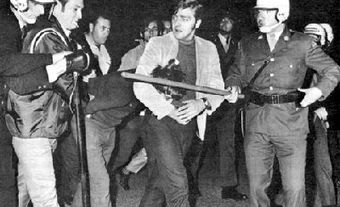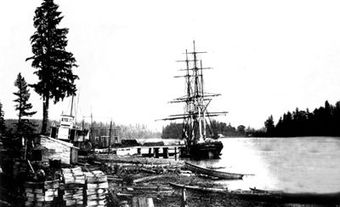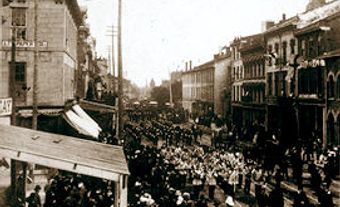Don Peter Garcia, longshore worker and trade unionist (born 29 October 1926 in New Westminster, BC; died 10 May 1995 in Vancouver). Don Garcia was a prominent figure in the labour movement (see Labour Relations). He served multiple terms as the president of the International Longshore and Warehouse Union (ILWU) Canadian Area. He was involved in union work for a total of 45 years, until his retirement in 1991. He also held many other posts, including being on the executive of the BC Federation of Labour and the Vancouver Port Corporation (National Harbours Board). He was a founding member of the Western Transportation Advisory Council (WESTAC). (See Shipping Industry.)
See also Working-Class History.

Definition
Longshoring: Labour-intensive work of loading and clearing ships’ cargoes
Early life
Don Garcia’s father, Peter Nahanee Garcia, was half-Hawaiian and half-Filipino. (See Filipino Canadians.) Don’s mother, Sadie Elizabeth Clark, was Squamish. From his father’s side, his grandfather José Garcia was one of the early Spanish-speaking Filipino fishermen who settled in Bowen Island. While from his mother’s side, both of his grandparents, Sophia Browne Clark and Fred Clark, were born in British Columbia to an immigrant father and an Indigenous mother. Don Garcia was raised in Surrey. He belonged to a group of longshoring and Indigenous communities in the Pacific Northwest.
Career Highlights
Don Garcia started longshoring work in New Westminster in 1947. (See Shipping Industry.) He followed his father’s footsteps by joining the International Longshore and Warehouse Union (ILWU). The ILWU is the main union of waterfront workers on the West Coast. It has over 60 local unions in the states of California, Washington, Oregon, Alaska and Hawaii. An autonomous branch of the ILWU was established in Canada in 1948. In 1963, Garcia was elected president of Local 502.
Three years later, he alongside nine other local presidents and then Canadian Area president Roy Smith defied an anti-union injunction by Canada's Supreme Court. The workers were refusing to work because employers did not want to grant them days off on statutory holidays. (See National Holidays; Provincial and Territorial Holidays.) Garcia was arrested, convicted and sentenced to three months in jail. Members and officers remembered him as a "tough and skilled negotiator."
Garcia was first elected Canadian Area president of the ILWU in 1970. He held that post for multiple terms: from 1970 until 1978, then from 1980 to 1984 and from 1986 until 1991. He had been president for upward of 17 years when he retired in 1991. During his ILWU career, he led dock workers in numerous contract negotiations and strike actions. (See also Labour Law; Strikes and Lockouts). He frequently had disputes with the BC Maritime Employers Association and the House of Commons.
Garcia fought for worker representation in New Westminster waterfront organizations such as the Harbour Commission. He became a prominent figure in the labour movement (see Labour Relations). He led the longshore workers in their struggle against the container system, which no longer required large crews on docks. They also fought job losses brought by the automation of the cargo shipment process from the 1970s onward. (See Shipping Industry.) Longshore workers also protested back-to-work legislation, which affected the union negatively at the bargaining table (see Labour Mediation; Collective Bargaining). One such incident in 1972 resulted in a lengthy strike of nine months.
Garcia served as a member of the ILWU International Executive Board. He was also a delegate to the Canadian Labour Congress. In 1971, he became a member of the Vancouver Port Authority (now Vancouver Fraser Port Authority). He was the only member from the labour sector. In 1972, he was elected president of the newly formed Pacific Maritime Council which brought together different waterfront unions. In 1976, he led ILWU delegates in a large workers protest in Ottawa against federal wage controls.
From 1982 to 1991, he was second vice-president of the BC Federation of Labour (BCFED). He was also a founding member of the BC Federation of Retired Union Members. This group is composed of union retirees who lend their experience and wisdom to the labour movement. Garcia was also one of the founding members of the Western Transportation Advisory Council (WESTAC), representing the labour sector. WESTAC is a not-for-profit organization that “unites business, labour and government in discussions, debate and resolution of challenges impacting gateways, corridors and supply chains.”

Death and Legacy
Many point to Don Garcia’s role in expanding and solidifying the ILWU’s pension plan as a defining legacy. His ILWU career finished in 1992 by negotiating one last local agreement. The agreement concluded close to midnight right before he turned 65 years old — then the mandatory retirement age in British Columbia.
After a two-year illness with cancer, he died on 10 May 1995 at age 68.
A memorial bench was installed along the banks of the Fraser River in New Westminster after his death. ILWU Canada also administers a Don Garcia Vocational Scholarship award in his honour.
ILWU Canada Remembers Don Garcia from The ILWU Canada Video Archive on Vimeo.

 Share on Facebook
Share on Facebook Share on X
Share on X Share by Email
Share by Email Share on Google Classroom
Share on Google Classroom



